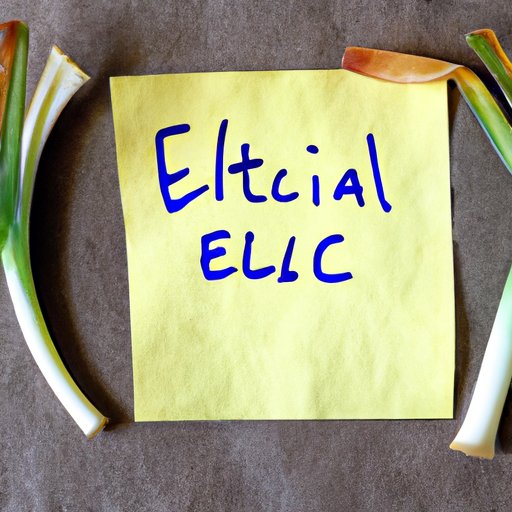
Introduction
Urinary tract infections (UTIs) are among the most common infections that affect millions of people every year. One of the leading causes of UTIs is Escherichia coli (E. coli), a bacterium that lives in the intestines of humans and animals. When E. coli spreads to the urinary tract, it can cause painful and uncomfortable symptoms such as frequent and urgent urination, burning sensations, and abdominal pain. If left untreated, E. coli infections in the urinary tract can lead to more severe complications such as kidney damage. In this article, we will discuss different ways to get rid of E. coli in the urinary tract, from natural remedies to medical treatments, and prevention.
Natural Remedies
Natural remedies are becoming increasingly popular as an alternative to medical treatments. These remedies are often perceived as safe and effective and don’t have any harmful side effects. Here are some natural remedies that can help get rid of E. coli in the urinary tract:
Cranberry Juice
Cranberry juice is a popular remedy for UTIs. It contains compounds called proanthocyanidins, which can prevent E. coli bacteria from attaching to the bladder walls and urinary tract. According to a review of studies, drinking cranberry juice regularly can reduce the risk of UTIs by up to 26%. However, cranberry juice is not effective in treating an existing infection and may not be suitable for people taking blood-thinning medication.
Apple Cider Vinegar
Apple cider vinegar contains acetic acid, which can create an acidic environment in the urine, making it difficult for bacteria to survive. Taking a tablespoon of apple cider vinegar daily in water or using it to dilute a bath can help prevent UTIs and reduce symptoms in some people. However, apple cider vinegar can be harmful to teeth enamel and should be diluted before consumption.
Probiotics
Probiotics are beneficial bacteria that can help restore the balance of the gut and urinary tract microbiota. Studies have shown that taking probiotics can prevent the growth of E. coli and reduce the risk of UTIs. Probiotics can be taken in the form of supplements or by consuming fermented foods such as yogurt, kefir, and kimchi.
Medical Treatments
In some cases, medical treatments may be necessary to treat E. coli infections in the urinary tract. Here are some common medical treatments:
Antibiotics
Antibiotics are medications that can kill bacteria and infections. They are often prescribed by doctors to treat UTIs caused by E. coli. However, it’s important to take antibiotics as prescribed and for the entire duration of the treatment to ensure that all the bacteria are eliminated. Repeated use of antibiotics can lead to antibiotic resistance, which reduces their effectiveness.
Hospitalization
In severe cases, a person with a E. coli infection in the urinary tract may require hospitalization. This may be necessary if the infection has spread to the kidneys or if there are complications such as sepsis. Depending on the severity of the infection, hospitalization may involve intravenous antibiotics, hydration, and other treatments.
Surgery
In some rare cases, surgery may be necessary to treat E. coli infections in the urinary tract. This may be necessary if there are complications such as kidney stones or structural abnormalities that increase the risk of recurrent UTIs.
Prevention
The best way to deal with E. coli in the urinary tract is to prevent it from happening in the first place. Here’s what you can do to reduce the risk of infection:
Stay Hydrated
Drinking plenty of water can help flush out bacteria from the urinary tract and prevent the buildup of harmful substances.
Practice Good Hygiene
Wiping from front to back after using the toilet can help prevent bacteria from the rectal area from entering the urethra. Avoiding feminine hygiene products and perfumed sprays in the genital area can also help.
Empty Your Bladder Frequently
Urinating regularly can help prevent the buildup of bacteria in the urinary tract.
Lifestyle Changes
Apart from following preventive measures, certain lifestyle changes can help reduce the risk of E. coli infections in the urinary tract:
Dietary Changes
Avoiding sugary and processed foods and consuming a diet rich in fiber can help promote a healthy gut and urinary tract microbiome.
Exercise
Regular exercise can help improve blood flow to the urinary tract and increase bladder capacity, reducing the risk of UTIs.
Stress Management
Chronic stress can weaken the immune system and contribute to the development of UTIs. Managing stress can help mitigate this effect and reduce the risk of infection.
Patient Experiences
Many people have successfully eliminated E. coli infections in their urinary tract using various remedies and treatments. One woman shared her experience on a health forum, explaining that she drank cranberry juice every day and doubled her water intake, which eliminated her UTI within a couple of days. Another person shared her experience with antibiotics, highlighting the importance of completing the entire course for it to be effective.
Conclusion
E. coli infections in the urinary tract are a common problem that can lead to discomfort and potentially harmful complications. Natural remedies, medical treatments, prevention, and lifestyle changes are all effective ways of dealing with this issue. It’s essential to take necessary steps to reduce the risk of infection and seek professional medical advice if necessary, to address the problem promptly.





